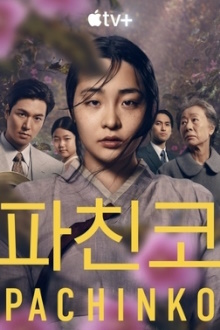Venturing a little outside of our usual picks for television shows, here’s a drama about Koreans who are in migrants in Japan. It’s really an American production, being an adaptation of an English-language novel by a Korean-American writer. That’s probably why this accords better with our tastes being a compact series with a fast moving pace, unlike the interminably long shows common in Asia. It covers multiple generations of the same family from roughly 1915 to 1989. We really liked the stories set in the distant past about the beginnings of the family but the material set in the 1980s seem uninspired. We’ll have to wait for the reviews to decide if we’re going to watch the upcoming second season.
In the Japan-occupied Korea of the 1920s, Sunja is born to an impoverished mother and a father who has been an outcast due to his cleft lip. Meanwhile in the 1980s, a successful banker in the US, Solomon, returns to Japan to pursue a lucrative deal and is revealed to be Sunja’s grandson. Parallel storylines trace the history of the family through the ages. Sunja’s father dies of illness when she is still a child. She grows up to be a confident and capable young woman and catches the eye of Hansu, a Korean man who has grown rich from working closely with the Japanese. She eventually lets herself be seduced by Hansu only to learn that he is already married with a Japanese family in Osaka. While being pregnant with Hansu’s son, she ends up marrying a Korean pastor whose life her mother saves. In later day Japan, we see that Solomon’s father Mozasu runs a pachinko parlor and Solomon involves himself in trying to persuade an elderly Korean woman to sell her valuable parcel of land in Tokyo to a large hotelier group.
Shows like this are always at risk of devolving into just another soap opera and indeed the later half of this season does get melodramatic. It wants the audience to feel sad on behalf of a new character Hana, yet we know next to nothing about her and her backstory will presumably be revealed only later. Usually I like shows which are really about particular settings and society systems instead of particular characters but this show takes it a little too far. In striving to tell the larger story of the plight of Korean migrants who are badly treated, each episode starts feeling that they are more about particular issues than stories of characters we are meant to care about. So there’s the episode about the Great Kanto Earthquake, the episode about the AIDS epidemic of the 1980s, and so on, and start to lack narrative coherence. At least the production values are excellent throughout and we get great views of Busan, Tokyo and Osaka through the ages.
The earliest stories are the most powerful ones as the stark reality of day to day life in a Korean fishing village under Japanese colonial rule is easy to grasp. I also suspect that it is a lot to do with the involvement of star actor Lee Min-ho. His screen presence is incredible and it’s undeniable that his character’s relationship with Sunja is far more interesting than that with her pastor husband. His character isn’t present in the 1980s scenes and the actor for Solomon just can’t match his charisma. It doesn’t help either that Solomon isn’t a very sympathetic character and that the elderly Sunja seems to have little influence over him. Perhaps they’re just setting things up for the next season but it doesn’t seem like a promising direction to me.
In the end, I’m left with mixed feelings. The season starts out very strong and I rather liked the concept of following multiple generations of the same family over time. Yet the connective glue that joins the generations feel very weak so they’re mostly unrelated stories. The show insists that the Korean community continue to be discriminated against even up to the present day but doesn’t attempt to portray how the nature of that discrimination has changed over time. It’s the type of show that’s good for raising awareness and indeed, few people know about the sizable Korean community in Japan. But in the end it’s really not that sophisticated so don’t expect too much from it.
